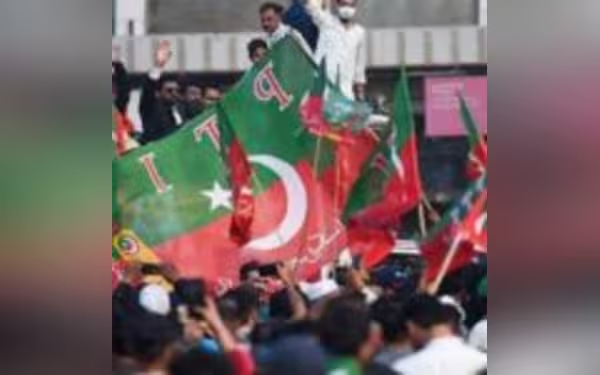Sunday, November 24, 2024 06:41 AM
PTI Leaders Detained as Crackdown Intensifies Ahead of November Protest
- Nafeesa Khattak and Akmal Khan Bari detained by police.
- PTI plans protest on November 24, termed 'day of freedom'.
- Government imposes Section 144 to prevent gatherings.
 Image Credits: pakistantoday
Image Credits: pakistantodayPTI leaders Nafeesa Khattak and Akmal Khan Bari detained as police intensify crackdown ahead of the November 24 protest in Pakistan.
In recent days, the political landscape in Pakistan has become increasingly tense as the Pakistan Tehreek-e-Insaf (PTI) party prepares for a significant protest scheduled for November 24. This protest is being referred to as the "final call" by PTI, and it has prompted a strong response from law enforcement agencies. The government has taken preemptive measures to curb PTI's mobilization efforts, leading to the detention of several key party leaders.
Among those arrested are Nafeesa Khattak, a former member of parliament, and Akmal Khan Bari, the PTI Punjab Vice President. Their arrests occurred in Islamabad and Lahore, respectively, as police conducted a series of raids aimed at preventing large gatherings. Despite these actions, Bari remained defiant, asserting that the protest would proceed as planned and declaring November 24 a "day of freedom" for Imran Khan, the party's leader.
The Interior Minister, Mohsin Naqvi, has defended the police's actions, citing a court ruling that prohibits large gatherings. He emphasized that any potential violence would be met with a "strict response." In preparation for the anticipated protest, authorities have closed off routes to the Red Zone in Islamabad using shipping containers and have deployed a substantial security presence, including 30,000 police and paramilitary personnel. Key highways connecting Islamabad with other major cities have also been shut down, and Section 144, which bans public gatherings, has been imposed.
PTI's central information secretary, Sheikh Waqas Akram, has urged supporters to gather at D-Chowk, framing the protest as a constitutional right. He expressed confidence that the rally would demonstrate significant public support for the party and its detained leader. The government, however, remains vigilant, having invoked Section 144 across Punjab for three days to prevent any potential unrest.
Security officials have raised concerns that public gatherings could become "soft targets for terrorists," highlighting the need for heightened security measures. In response, major reinforcements have been dispatched to Islamabad, with thousands of personnel from various provinces and law enforcement agencies arriving to maintain order.
As the situation unfolds, it is clear that the political climate in Pakistan is charged with uncertainty. The upcoming protest not only represents a critical moment for PTI but also poses significant challenges for the government in balancing public safety with the right to protest. The events of November 24 will likely have lasting implications for the political landscape in Pakistan, and citizens are left to ponder the future of their democracy amidst these turbulent times.













